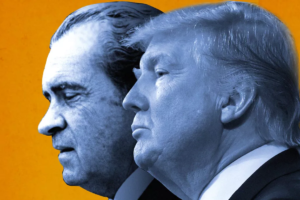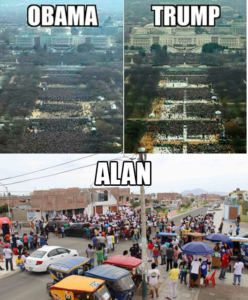Why the Comey firing could be Trump’s Watergate moment

Image: https://cdn0.vox-cdn.com/thumbor/ECdygTCK9tKSHafb9xyFmXjiOqQ=/0x0:2232×1368/920×613/filters:focal(760×445:1116×801):format(webp)/cdn0.vox-cdn.com/uploads/chorus_image/image/54705059/nixon_trump3.0.jpg
It’s genuinely rare to be able to say you’re living in a historic moment, one already being compared with some justification to Watergate. But that’s where we find ourselves in the aftermath of President Trump’s stunning dismissal of FBI Director James Comey.
There’s a huge amount to unpack here, but here’s what is perhaps the single most important fact: The president of the United States, whose campaign is under FBI investigation over its potential ties to Russia, just fired the head of the FBI — the person in charge of that very investigation.
Mounting evidence that multiple members of the Trump campaign were in direct contact with Russian intelligence in the runup to the election — and in several cases subsequently lied about it — has been at the center of a simmering scandal that Trump has been unable to shake. His sudden decision to oust Comey ensures that scandal will bedevil the rest of the Trump presidency — and, potentially, bring it to a premature close.
Let’s pause and note that Deputy Attorney General Rod Rosenstein said that Comey was ousted over his grievous mishandling of the FBI’s Hillary Clinton email probe, a gaffe that may have cost Clinton the presidency and that has been the subject of an ongoing investigation by the Justice Department’s own internal watchdog. Comey drew new criticism earlier Tuesday when the FBI was forced to walk back his false assertions that Clinton aide Huma Abedin had improperly forwarded thousands of emails to her husband, Anthony Weiner.
The FBI chief may have deserved to lose his job over how badly he bungled the Clinton probe — which included breaking with historical precedent and disclosing, just 11 days before the election, that he was reopening the probe into her email servers — but imagine if he had been fired by a President Hillary Clinton. Republicans across Capitol Hill would be making immediate calls for her impeachment.
Initial comments from powerful Republicans like Senate Foreign Relations Chair Bob Corker suggest that the GOP is in a wait-and-see mode and hasn’t yet decided to break with Trump. Still, the Comey firing is already leading to calls for a special prosecutor capable of issuing subpoenas without needing the approval of Republican-led committees in the House and Senate.
We’ve known for months that there is something damaging in the Trump team’s dealings with Moscow. The FBI and the House and Senate intelligence committees are focusing in on three people who worked for, or unofficially advised, the Trump campaign: former campaign chair Paul Manafort, former foreign policy adviser Carter Page, and Republican political operative Roger Stone.
THE DECISION TO FIRE COMEY ENSURES THAT SCANDAL WILL CONSUME THE REST OF THE TRUMP PRESIDENCY — AND, POTENTIALLY, BRING IT TO A PREMATURE CLOSE
But that’s the tip of the iceberg. Former National Security Adviser Michael Flynn was fired for lying about his contacts with Russian Ambassador Sergey Kislyak, and has sought an immunity deal as evidence mounts that he accepted money from the Russian and Turkish governments without properly disclosing it. Senior White House aide — and Trump son-in-law — Jared Kushner held undisclosed meetings with Kislyak during the transition and only made them public months later.
Perhaps most alarmingly, Attorney General Jeff Sessions lied to the Senate, under oath, during his confirmation hearings. He told lawmakers he’d had no interactions with the Russian government; it turned out that he’d held conversations with Kislyak. Sessions promised to recuse himself from the FBI investigation into Trump. Sessions is also the man who just recommended that Trump fire the head of the FBI, a recommendation Trump accepted.
The Comey firing is sure to spark waves of new hearings on Capitol Hill, each of which will give Democrats and some Republicans the chance to ask the questions on the minds of many Americans: Was the Comey firing part of a White House cover-up? And if so, what is the administration trying to hide?
How we got here
Here’s what we know for sure.
In July 2016, the FBI launched an investigation into the various ties between the Trump campaign and Russia. The bureau soon acquired a warrant to spy on Carter Page, a Trump foreign policy adviser with longstanding financial ties to the Kremlin. After Trump’s election, the investigation took on considerably more urgency — with Comey personally approving more scrutiny, according to the Guardian.
In December, Sen. John McCain personally handed Comey a dossier from a former British spy, Christopher Steele, alleging that the Russians had compromising material on Trump and that the Trump campaign actively coordinated with Russian hackers targeting Clinton. By early January, the FBI had confirmed that Steele’s sources were credible and its contents could not be dismissed, forcing them to brief both President Obama and President-elect Trump on its contents.
The FBI’s investigations took on new urgency after Trump took office, and the Trump administration kept stepping on rakes when it came to Russia. That’s when the Flynn-Kislyak scandal broke and when Sessions lied under oath about his own contacts with the ambassador during the campaign, which forced him to recuse himself from supervising the Russia investigation in early March.
Both the House and Senate Intelligence Committees had, at this point, started their own investigations into Russian involvement in the 2016 election. On March 20, Comey was called to testify before the House Intelligence Committee — chaired by Rep. Devin Nunes — about the status of the FBI’s investigation. That’s when he dropped his biggest bombshell yet.
“[The FBI is] investigating the nature of any links between individuals associated with the Trump campaign and the Russian government and whether there was any coordination between the campaign and Russia’s efforts,” Comey said.
After this announcement, it became impossible — regardless of what Trump said in Tuesday’s letter — to separate the FBI’s investigation into Russia from an investigation into the president. Clearly, Director Comey had given consent and support for an investigation into the Trump campaign’s links to Russia. You simply can’t look into whether close Trump associates had improper contact with Russia without looking into the question of whether the president approved their actions. It would also come back to the core issue from Watergate: “What did the president know, and when did he know it?”
Two days after Comey’s testimony, it became clear that the FBI’s investigation was extremely serious. CNN reported that “the FBI has information that indicates associates of President Donald Trump communicated with suspected Russian operatives to possibly coordinate the release of information damaging to Hillary Clinton’s campaign.” This information came from “human intelligence, travel, business and phone records, and accounts of in-person meetings.”
The information, CNN’s reporters cautioned, “was not conclusive.” But the point is that it was already pointing in a direction that could implicate Trump officials. If that happened — if the FBI actually uncovered hard proof that the Trump campaign had coordinated with the Russians — it would end up being the kind of scandal that topples a presidency.
By early April, the FBI investigation into Russia had gotten so massive that the bureau had to form a special unit for it in Washington. Meanwhile, the House investigation had stalled out due to Nunes’s weird insistenceon backing up Trump’s wild claims about Obama spying on Trump Tower (which would eventually force Nunes to recuse himself). The Senate investigation, only given limited funding and staff, was proceeding slowly — to the point where senators were publicly complaining about the pace.
TRUMP KEEPS DISMISSING THE INVESTIGATIONS INTO HIS TIES TO RUSSIA AS “FAKE NEWS.” THE COMEY FIRING IS ANOTHER REMINDER THAT IT’S NOT.
The point of all of this is simple: The FBI was conducting by far the most serious investigation into Trump and Russia in the country, one that simply couldn’t be matched by Congress or by journalists. The bureau had the money, the trained investigators, and the access to powerful surveillance tools. Perhaps most importantly, it also had a director who seemed to be entirely behind the investigation.
And then Trump and Sessions fired him.
Democrats are comparing this to Watergate. They have good reason to.
In the immediate aftermath of the Comey firing, leading Democrats were quick to compare the move to the biggest political scandal in American history: Watergate. And they were quick to issue calls to create the position that ultimately led to the downfall of Richard Nixon: a special prosecutor with broad investigative powers and the freedom to follow evidence without needing congressional approval.
Take this, from New York Democratic Sen. Kirsten Gillibrand: “No more excuses. We need an independent special prosecutor to investigate the Trump Administration’s ties to Russia.”
Or this, from Hawaii Democratic Sen. Brian Schatz: “The arguments against establishing a Special Prosecutor were weak in the first place. They have now evaporated.”
But to get a real sense of where the public narrative over the firing is already headed, there is no better example than this comment from Massachusetts Democratic Sen. Edward Markey. The Comey firing, he said, was “disturbingly reminiscent of the Saturday Night Massacre during the Watergate scandal & the natl turmoil that it caused.”
Watergate has a singular resonance in American political life, so much so that nearly every scandal eventually has a “-gate” added to its name. But even Watergate didn’t immediately explode into the historic scandal that eventually led to Nixon’s resignation. The turning point, arguably, came in the specific moment that Markey is referencing: the so-called Saturday Night Massacre. That’s when Nixon attempted to kneecap a dangerous investigation into hiswrongdoing.
In October 1973, during the heat of the Watergate crisis, special prosecutor Archibald Cox issued a subpoena ordering Nixon to turn over copies of taped conversations recorded in the Oval Office. Nixon refused.
On October 20, the embattled president ordered Attorney General Elliot L. Richardson to fire Cox. Richardson refused, and resigned in protest. Nixon then gave the same order to Deputy Attorney General William D. Ruckelshaus, who also refused and also resigned. Cox wasn’t fired until then-Solicitor General Robert Bork — later a failed nominee to the Supreme Court — agreed to do what the other two officials would not.
Richard Painter, formerly the chief ethics lawyer in the George W. Bush White House, notedon Twitter that “Nixon had to go through three AGs to fire the man investigating Watergate. POTUS should not be allowed to fire the man investigating him.”
There was a second, lesser-known part of what came to be known as the Saturday Night Massacre that is relevant here. After getting Cox fired, Nixon, per a Washington Post articlefrom the time, “also abolished the office of the special prosecutor and turned over to the Justice Department the entire responsibility for further investigation and prosecution of suspects and defendants in Watergate and related cases.”
And that’s the rub here. It isn’t simply that Trump fired the man charged with leading the explosive investigation into whether his campaign colluded with Russia as Moscow was looking for ways to ensure Hillary Clinton’s defeat. It’s that Trump is putting that investigation back in the hands of a Justice Department led by Jeff Sessions, whose own ties to Russia — and his own lies about them — make him singularly unfit to have any role in determining the future course of the Trump-Russia investigation or who will be leading it.
It’s worth remembering how the entire story ends. Nixon’s attempt to bottle up the Watergate investigation by firing Cox bought him some more time, but it ultimately failed. In August 1974, with Congress moving to formally impeach and remove him from office, the president resigned.
These are obviously different times, and Republicans on Capitol Hill have shown a depressing willingness to carry water for Trump and try to deflect calls for special prosecutors or bipartisan commissions like the one that investigated the 9/11 attacks.
But every White House scandal eventually reaches a turning point, one in which historians later look back on as the moment that ultimately determined whether a president survived or was forced from office. We are now at that moment.
In: vox




